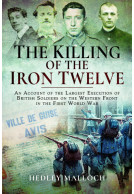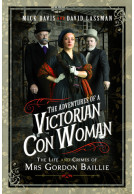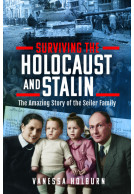Nurses of Passchendaele (ePub)
Caring for the Wounded of the Ypres Campaigns 1914 - 1918
Imprint: Pen & Sword History
File Size: 32.1 MB (.epub)
Pages: 196
Illustrations: 46 black and white illustrations
ISBN: 9781526702906
Published: 26th June 2017
Publicity
- Forces War Records' Book of the Month (July 2017)
- Passchendaele's untold army of women nurses via BBC News
- Remarkable bravery shown by nurses who tended to wounded soldiers as bombs rained down on them is revealed via Mail Online
- Chosen as the Editor's Choice in the November 2017 issue of The Great War Magazine
| Other formats available | Price |
|---|---|
| Nurses of Passchendaele Paperback Add to Basket | £14.99 |
The Ypres Salient saw some of the bitterest fighting of the First World War. The once-fertile fields of Flanders were turned into a quagmire through which men fought for four years. In casualty clearing stations, on ambulance trains and barges, and at base hospitals near the French and Belgian coasts, nurses of many nations cared for these traumatised and damaged men.
Drawing on letters, diaries and personal accounts from archives all over the world, The Nurses of Passchendaele tells their stories - faithfully recounting their experiences behind the Ypres Salient in one of the most intense and prolonged casualty evacuation processes in the history of modern warfare. Nurses themselves came under shellfire and were vulnerable to aerial bombardment, and some were killed or injured while on active service.
Alongside an analysis of the intricacies of their practice, the book traces the personal stories of some of these extraordinary women, revealing the courage, resilience and compassion with which they did their work.
5 out of 5
Army Rumour Service (ARRSE)
I would suggest this is a book for any nurse to read and military nurses in particular as this is your history of why and who you are.
Read the Full Review Here
Hallett writes captivatingly without jeopardizing the scientific claim of her book. A certain pathos is certainly due to the British commemoration of the First World War. "The Nurses of Passchendaele" supplements nursing history literature in Germany as well and is a must-read in 2018/2019.
Pflege Professionell, Dr. Anja K. Peters
Read the full German review here
As featured in
Stand To! Western Front Assc No.111
There is a lot in this book which paints a picture not only of the invaluable contribution of the nurses themselves, but the wider context of the war itself.
Military Model Scene - Robin Buckland
Read the complete review here.
Christine Hallett has written a moving and
Royal College of Nursing
engrossing new book which remembers
the nurses who cared for the men of this
campaign on the allied side.
Hallett uses nurses’ letters, diaries and
personal accounts from archives all over
the world to tell their stories and she paints
a vivid picture of the conditions in which
they had to work. Their courage and
compassion is clear. Siegfried Sassoon, the
war poet, famously said “I died in hell, they
called it Passchendaele” and the nurses
who endured this hell were themselves
profoundly moved by their experiences.
Their professionalism shines through in
their writing, as does their resilience. This
book is a fitting testament to their work
and a compelling read.
In this impressive read, Hallett has somehow managed to bring together the stories of nurses, soldiers, doctors and others who were involved in the prolonged and unrelenting Ypres campaigns. At first glance, the reader expects to be taken on a journey with a few nurses who happened to be in or around the Ypres salient during some of history’s most gruesome battles. Instead, Hallett gives us insights into caring from a wide range of perspectives, from the local women who nursed civilians injured and maimed as unfortunate collateral damage, through to Red Cross and military nurses from across the globe who all found themselves nursing the human by-product of modern war.
Australian Defence Journal
The author is to be commended for an engaging, easy to read account which draws the reader in and which provides a compelling insight into the life and work of these remarkable women. Worthy of a place on anyone's bookshelf.
The Great War magazine, November 2017 – reviewed by Mark Marsay
Excellent. 10/10
By charting the progress of the Ypres offensives in some detail, principally through the eyes of
British Society for the History of Medicine
women too often forgotten by historians, Hallett gives us a totally new perspective on the war, and
for that reason her book is a valuable addition to those interested in the history of military medicine.
The two books I have so far read and reviewed on Passchendaele concentrated on military involvement and engagements. This superb book looks at the part played by the nurses, their courage under fire, their determination to help, and their compassion. Uplifting and inspiring.
Books Monthly
A very readable and scholarly description of the care and treatment of wounded soldiers on the Western Front during World War I. The author, Christine E Hallett is a very skilled woman, Professor of Nursing History at Manchester University, a trained nurse, who practiced from 1985 to 1989, then moved into research and teaching. She holds two PhDs, one in Nursing and one in History. As the title promises, the author concentrates on the role of nurses, including professionals of Queen Alexandra’s Imperial Military Nursing Service, QAIMNS (Reserve) and Territorial Force Nursing Service, and volunteers of Flying Ambulance Corps (founded by Hector Munro), Friends Ambulance Unit (confusingly listed as Quaker Ambulance Unit in index), Red Cross, St John Ambulance Brigade & Nursing Division and Voluntary Aid Detachments.
Army Rumour Service (ARRSE), Jean Sinclair
Read the complete review here.
★★★★★ This book reduced me to tears in places - and apparently has had the same effect on others. It is incredibly detailed, moving and beautifully written: a commemoration of the wonderful work done by the nurses in the most trying conditions. Along the way, it is fascinating and unusual to find details of individual patients, who have clearly been patiently researched, and the differing views of the nurses tending them. This is medical history - and very human history - of the highest order.
Amazon Customer
this books main aim is to capture the way the perspectives of the nurses involved and it draws heavily on letters, diaries and personal accounts from across the world. It describes the way the medical systems worked and the challenges faced by the nurses with the conditions and the injuries they had to cope with. With the interest in medical advances of WWI this book is well worth getting to add to your knowledge.
Guild of Battlefield Guides
A very welcome new book from an author with a passion for her subject. A well-researched study of a subject that has received far less attention than it merits. The photo-plate section is well selected, with images that have not previously appeared in a printed work. There are also extensive notes on the sources used, making this a valuable reference work in addition to being a fascinating story – Most Highly Recommended.
Firetrench
Read the complete review here.
As seen on.
ITV Calendar News 31/7/17
As featured in
Stand To! Western Front Assc No.109
An absolute joy of a book both to read and to review, written by an acknowledged expert in her field and written to be readable! Professor Hallett sets the story of the nurses of the First World War in the contexts both of the history of the military conflict and the history of the development of nursing practice, against the background of the changes in medical methods which changed so markedly to meet the new demands imposed by modern warfare – specifically, the ghastly wounds imposed by shrapnel, the infections acquired in years of trench warfare, and the deadly new effects of poison gas, which could have the same crippling and deadly effects on nurses as easily as on soldiers. The scale of casualties appals the modern reader, as it should, and sharpens our appreciation of the resourcefulness and heroism of the nurses faced with the multiple challenges of handling many hundreds of badly-wounded soldiers while themselves grossly inadequate in numbers and in many cases with only modest skills, while under shell-fire, poison gas, and aerial bombing.
Wakefield Historical Society
Professor Hallett, who will be one of our lecturers this winter, marshals a superb array of original sources with wisdom and sensitivity, from the well-known such as Elsie Knocker and Mairi Chisholm, the “Angels of Pervyse” (where she finds new material to write and new observations to make) to the less well known such as our own Wakefield nurses, Nellie Spindler of Aberford Road, the centenary of whose death falls on 21 August this year, and Minnie Wood. This book is well worth buying for the stories of the nurses themselves, but is especially so for setting those stories against a background which is so often lacking in such works, and in doing so in such a way that the general reader can appreciate the magnitude of the nurses’ achievement as well as their sacrifice.
5-star rating. Thoroughly recommended.
With copious notes, a bibliography, a detailed index and some wonderful black and white photographs, this is a fantastic book and really good value at £12.99. I recommend that you read it.
Inspirational Women of WW1, Lucy London
Check out the complete review here.
As featured in 'reviews in brief' by Rosemary Collins
WDYTYA? Magazine – July 2017
Article by Christine E. Hallett on the military nurses at Passchendaele featured in
History Today, July 2017
As featured by
Military History Monthly, July 2017
As featured by
Military History Monthly, June 2017
As featured in.
The Bookseller 10/3/17
About Christine E Hallett
Christine Hallett is Professor of Nursing History at the University of Manchester. She is Chair of the UK Association for the History of Nursing and President of the European Association for the History of Nursing, and holds Fellowships of the Royal Society of Medicine and the Royal Society for the Arts. She is a trained nurse, and has PhDs in both Nursing and History. She practised as a nurse in the North of England from 1985 to 1989, before moving into teaching and research. Her most recent work has focussed on the nurses of the First World War, and among her many publications are three single-authored books: Containing Trauma: Nursing Work in the First World War (Manchester University Press, 2009); Veiled Warriors: Allied Nurses of the First World War (Oxford University Press, 2014); and Nurse Writers of the Great War (Manchester University Press, 2016).
















